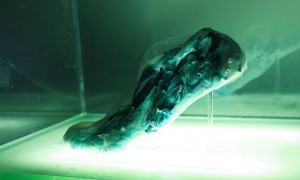The Synthetic Biology mashup is a weekly review of articles and pieces of news related to synthetic biology. While we share most of this on our twitter feed, if you need to catch up on this week’s headlines just read on!
New Shoe Design Based on Protocell 3D Science
Shamees Aden, a London-based designer and material researcher, has come up with a model of a novel running shoe in collaboration with University of Southern Denmark professor Martin Hanczyc. The shoe will be 3D-printed from protocells to fit the exact size of a user’s foot, like a second skin. Protocells are synthetic molecules that when combined act and have properties of living cells, such as reacting to pressure as to adapt to a specific ground surface. The shoe concept will be designed to be placed in an incubator overnight that would work like a “charger” regenerating used layers of protocells.
Germany-based Evonik Industries, an industrial biotechnology company, and US-based LanzaTech, a synthetic biology and gas fermentation industry, signed this week a 3-year research cooperation agreement. They are combining their expertise to develop a route for the production of bioprocessed precursors for specialty plastics from waste derived carbon monoxide, carbon dioxide and hydrogen. They are planning to use LanzaTech proprietary microorganisms in fermenters to turn these gases from different waste streams, such as forestry, into chemical products. Through the use of synthetic biology tools, waste streams can be harvested and both companies aim to reduce the current dependence on fossil fuels and promote the use of green chemicals.
New Fungal Molecule with Anticancer Properties Identified through Crowdsourcing
Unusual fungal metabolites with antitumor activity were discovered through crowdsourcing, the cooperation of a number of lay citizens. A research group from the University of Oklahoma headed by Robert H. Cichewicz asked non-scientists to take part in the collection process by submitting soil samples from their properties along with the specific location. Using this approach, Andrew Miller at the University of Illinois uncovered a new fungal strain, Tolypocladium species, in a soil sample from Alaska. The strain was uniquely responsive to environmental changes, and produced several new compounds, including a metabolite with antitumor activity named maximiscin. The article published in Angewandte Chemie International Edition highlights the current contribution of citizen scientists in drug discovery.
Synthetic Biologics and Intrexon Target a Subset of Irritable Bowel Syndrome Cases
Synthetic Biologics, a biotechnology company focussed on the prevention and treatment of diseases, and Intrexon Corporation, a leader in synthetic biology, announced this week that they have initiated the development of novel biologic approach for a subset of Irritable Bowel Syndrome (IBS) pathologies caused by auto-antibodies. Some IBS cases can be caused by encounters with acute infectious gastroenteritis which have been observed by Cedars-Sinai Medical Center Hospital to lead to an autoimmune response due to the cross-reaction of antibodies produced for the bacterial toxins and antibodies produced for a protein important for controlling gastrointestinal motility. Synthetic Biologics plans to use the available data, and by accessing Intrexon’s proprietary technologies, to develop a vaccine against the bacterial toxin that would not interfere with the gastrointestinal motility protein. Such treatment would be particularly beneficial for the subset of IBS patients that have so far no other option than supportive care. This is the third collaboration between these two companies since 2012 for the treatment of pathogen-specific diseases.
The iGEM Competition as a General Education Paradigm
This week Forbes published an article promoting the international Genetically Engineered Machine (iGEM) competition as an essential component of synthetic biology education. iGEM gathers every year teams of students from all over the world competing to design, build and test of synthetic organisms with useful properties The article presents iGEM as an innovative and unique way to best prepare the future leaders of synthetic biology through hands-on experience. It goes on to suggest that similar educational models could be adapted in other disciplines in order to best follow the exponential knowledge curve of the 21st century.
Synbo Consulting has been following really closely the development of iGEM and recently released the first interactive map of all iGEM projects ever done, providing an in-depth view at the Synthetic Biology ecosystem.
That’s it for this week’s Synthetic Biology Mashup! A suggestion or a question? Shoot us an email.


